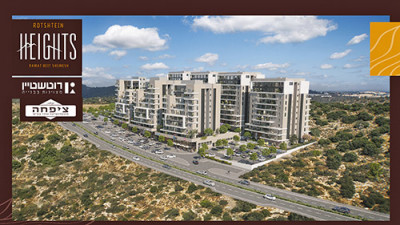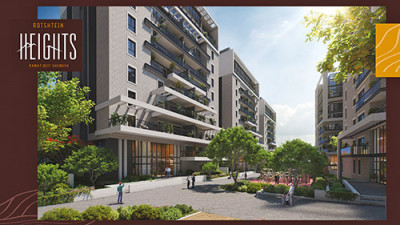
Last month, Rabbi Larry Rothwachs wrote to his community in Teaneck, informing them that he will likely let his contract with Congregation Beth Aaron expire in 2027, as he prepares to head a new community in Ramat Bet Shemesh called Rotshtein Heights. As a result of this announcement, the call to consider aliyah will potentially now have an even stronger voice than it does already in the Bergen County region.
The builders and developers of Rotshtein Heights have invited the Rothwachs family to help lead this new venture, providing a special opportunity for them to fulfill their personal aspiration to live in Israel while enabling them to continue their life’s work as community leaders and teachers of Torah. The Rotshtein Company is one of the largest developers of apartments in Israel, with more than 60 years of experience. They have developed residential housing all across the country, including Netanya, Ramat Gan and Tel Aviv.
The development Rabbi Rothwachs will be joining is part of a 1,300-unit project adjacent to Ramat Beit Shemesh Aleph. “The new community and shul that we are planning to develop is called Maromei Shemesh, whose name has both a literal and figurative implication as it conveys a message of growth and reaching for new heights, personally and spiritually,” Rabbi Rothwachs said. The planned development is to include shuls, schools and parks, among other amenities.
“Although I will be actively involved in the formation of the inaugural kehillah and shul, we anticipate the ultimate need for multiple shuls in order to accommodate many future residents,” he added.

Rabbi Rothwachs presents a significant draw for a new community; it would be difficult to overstate the impact that he has had on Teaneck, Bergen County and the larger YU community. Rabbi Rothwachs, whose family moved to Fair Lawn from Far Rockaway when he was 9, has lived in the region for much of the past 40 years. He and his wife, Rebbetzin Chaviva, have served at Congregation Beth Aaron for the last 21 years.
Both Rabbi and Rebbetzin Rothwachs have roots of service in Bergen County going back to the early years of the Northern New Jersey frum community’s growth and development. Chaviva Rothwachs is a daughter of Rabbi Benjamin Yudin, the longtime impactful mara d’asra of the Fair Lawn community and Rabbi Rothwachs’ foundational communal rebbi; and Rabbi Rothwachs’ mother, among other things, was the founding dean of SINAI Schools, a inclusion-based yeshiva day school system for students with complex special needs. When asked of the Yudins’ future plans, Rabbi Rothwachs said his in-laws are “excited at the prospect of being able to spend considerably more time in Israel,” noting that Rabbi and Rebbetzin Yudin in Fair Lawn recently stepped down as senior clergy from Congregation Shomrei Torah after 50 years of service.
But service and family connections notwithstanding, Rabbi Rothwachs’ influence goes way beyond a traditional biography. One noteworthy and possibly the most memorable single example, is that in 2015 the rabbi, quite physically, gave of himself to his community, by donating a kidney to Donny Hain, a well-known Teaneck man who had been on dialysis for the previous three years. Rabbi Rothwachs spoke about his decision to donate, of finding himself able to fulfill the mitzvah of pikuach nefesh (saving a life) both from the pulpit and privately, through the kidney donor group Renewal, and on his own. He made himself available to those who might consider donation as well. Subsequently, he normalized the discussion of what was, for many, a complex and frightening issue, and hundreds in our community considered altruistic kidney donation for the first time. There are now scores of donors in the Teaneck community who can trace their first thought to donate to Rabbi Rothwachs’ interpretation of this mitzvah.

While this is an impressive and very public example of Rabbi Rothwachs’ work, his teaching and leadership on other public initiatives, such as those that blur the lines of social work and rabbinic outreach and counseling—in particular to those facing substance addiction or eating disorders—have been very powerful, as has his guidance in helping families facing catastrophic illness, loss, abuse and interpersonal relationship issues. Rabbi Rothwachs was directly involved in the founding of CCSA (Communities Confronting Substance Use and Addition) and has worked closely with other major local organizations that serve the needs of the regional community. He shared his fond memories of working closely together with Rabbi Yossie Stern, z”l, who founded Project Ezrah over 20 years ago.
Rabbi Rothwachs has made it a personal priority to publicly address communal issues that seem to receive less attention, despite their prevalence and urgency. “Several years ago, we launched a program at Beth Aaron called ‘Talking in Shul,’ at which time we opened discussions and dialogue regarding many sensitive topics that typically go unaddressed within the larger community,” he said. “We focused on many relevant issues that are often subject to stigmatization, including mental health challanges, sexual abuse, criminality, racism, crises of faith and religous observance, and more. Slowly but surely, more and more productive conversations were taking place and extending well beyond the walls of Beth Aaron, thanks in part to the efforts of The Jewish Link.” Several years ago, Rabbi Rothwachs went to great lengths to spotlight his concerns regarding the high school admissions process in Bergen County, an issue which he believes is still in need of reform.
Rabbi Rothwachs is the head rabbi at Camp Morasha, and for approximately 18 years served as a rebbe at MTA, the Yeshiva University High School for Boys, and as an eighth-grade rebbe at RYNJ. In 2015, he was appointed to the position of director of professional rabbinics at Yeshiva University’s Rabbi Isaac Elchanan Theological Seminary (RIETS), where several of the future rabbis he now teaches had sat with him as early as eighth grade and were already well acquainted with their rav, now widely acknowledged as a master teacher in the area of pulpit rabbinics. When asked if he plans to continue to train rabbis from Israel, he replied, “Personally, I would love to continue my work with RIETS from Israel. I have such a love and passion for this work and I believe there is plenty of opportunity to continue from Israel.”
Rabbi Rothwachs is not just a rabbi, but a rabbinic mentor and a rabbi’s rabbi, so to speak; he has also influenced his own community to become well known for chesed and social change within and outside its own community, and within the Rabbinical Council of Bergen County (RCBC), of which he has served in virtually every leadership position.
When asked to describe the builders’ vision for a new community with Rabbi Rothwachs at the helm, Avi Nefoussi, sales director of Rotshtein Heights, replied: “Rotshtein Heights is an upscale new community that is being built within walking distance of Ramat Shilo in Ramat Beit Shemesh Aleph. We met with Nefesh B’Nefesh staff, who mentioned the need to build a community for olim which has the infrastructure, amenities and location that will address the physical, spiritual, social and educational needs of olim. Soon after, the connection was made between us and Rabbi Rothwachs, and his communal vision, which felt like a perfect fit for this project. The developer, an experienced and highly regarded company, is an ideal partner for this burgeoning community, as they understand the needs and expectations of overseas clients. For example, they are offering a shul for the community’s use from day one.”
“I want to make it clear this is not an attempt to transplant Beth Aaron to Israel,” Rabbi Rothwachs clarified. “The message is not, ‘let’s all do this together as a shul,’ but certainly, to the extent that this time is right for some people, or perhaps even for those who have already made aliyah but are not quite settled, this may be a perfect opportunity for many to get in on the ground level of an amazing dream, creating a community that offers the best of what we have here, combined with the immeasurable potential that Israel has to offer.”
Rabbi Rothwachs noted that he and his wife had always considered aliyah as a plan for their future. Now, with two of his children and three of his four grandchildren living in Israel, the time seems more right than ever before. Additionally, he boasts with genuine pride that “over the past two decades, 20% of the members of our shul have made aliyah.” Citing an idea that had recently been shared with him, he reflected, “Outside of the land of Israel, we strive, to a large extent, to preserve all that we have and to ensure our survival in the Diaspora. Community development in the land of Israel has somewhat of a different focus. The model shifts from one of preservation and survival to one of building and developing the infrastructure of our future.”
But, at this relatively early stage in the unfolding of this dream, “There are still as many questions as there are answers,” Rabbi Rothwachs acknowledged. “The vision of this community is evolving and expanding in real time. I hope to continue to share information about Maromei Shemesh, for all those who might be interested, if not now, then at the right time.”
For now though, Rabbi Rothwachs remains grounded and focused here in Teaneck. “Listen,” he insisted, “at the end of the day, we are all Israel-bound. It is not a matter of if, rather when. But for now, we are here, and, as we all know, there is still plenty of important work to do.”
By Elizabeth Kratz










